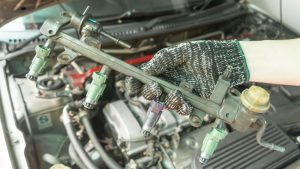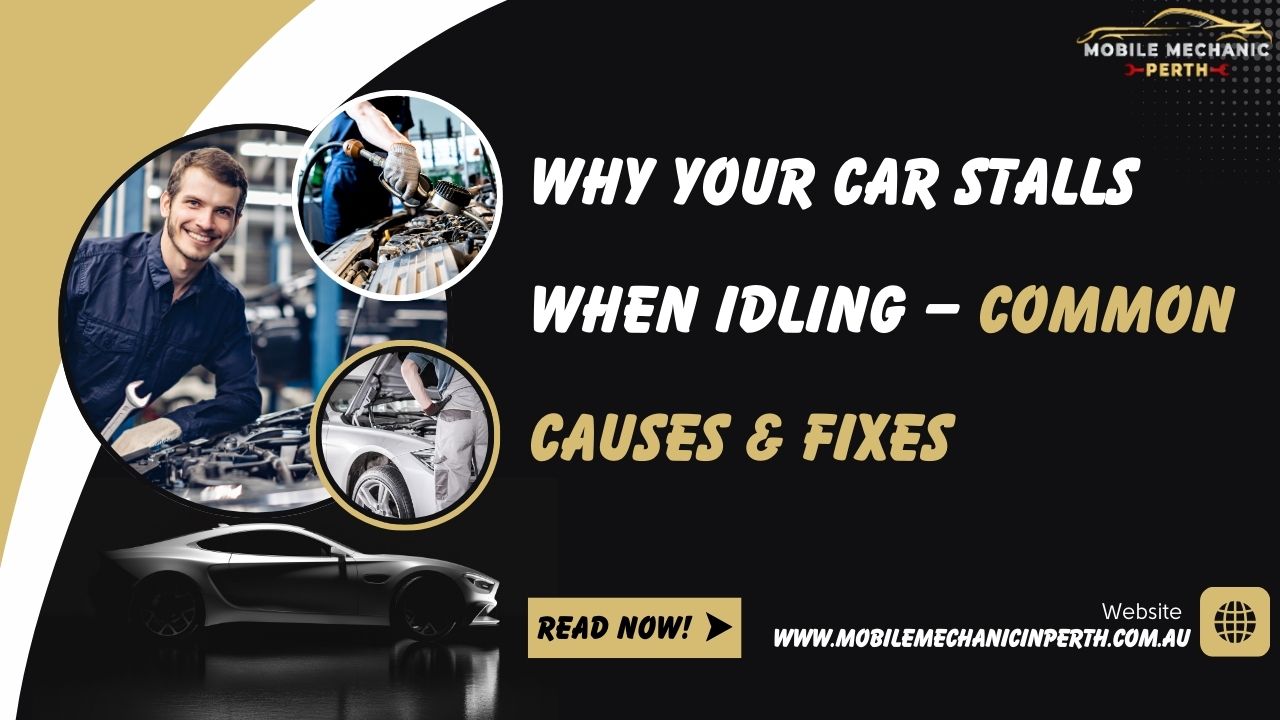Nothing is more frustrating than when your car stalls when idling, particularly when you are in a traffic jam or waiting at a signal. A sudden stall not only disrupts your drive but can also signal deeper problems under the hood. And as far as air and fuel complications, to electrical faults, there are a number of factors that may be causing this frequent headache. Keep reading as we will share with you the core reasons why your car stalls and what you can do to correct the situation.
Reasons Why a Car Stalls When Idling
Your car stalling at idle is the last thing you want when you’re in traffic. Below, we have listed some of the most common causes that result in your vehicle stalling while idling:
1. The Faulty Mass Airflow Or Oxygen Sensors
The oxygen sensor and mass airflow sensor are available in cars that control air intake and exhaust. Even when a single sensor goes bad or is damaged, the amount of air it supplies to the combustion chamber differs, thereby disturbing the ideal air and fuel ratio of the air-fuel mixture. This makes it hard for the fuel to burn, which results in your car stalling when stopping.
2. Defective Transmission
In automatic cars, the torque converter acts as the automatic clutch; it is responsible for transferring power from the engine to the whole drivetrain in automatic gear. Your car stalls when idling due to a worn-out torque converter and requires massive repairs, which cost a lot of money. But, if you are lucky enough, the malfunction of the transmission is caused by a bad solenoid, which works to control pressure. Repairing a defective solenoid is easy and affordable.
3. Plugged EGR Valve
EGR stands for Exhaust Gas Recirculation. The function of EGR is to recirculate a portion of the exhaust back to the combustion chamber. Its function is to maintain an optimal temperature inside the engine. Because they are usually composed of carbon dioxide exhaust gas, it does not burn inside the combustion chamber, which actually lowers the temperature.
When the valve controlling the exhaust flow of EGR gets clogged, it will remain closed or open and allow the exhaust to keep flowing continuously or stop flowing. While this happens, the air or fuel balance in the combustion chamber changes and results in a loss of power, and your car shuts off while idling in drive.
4. Bad Spark Plugs
Spark plugs are the one that ignites the air/fuel mixture in the combustion chambers, which powers the engine to move the car. The spark plugs become less efficient in igniting the mixture when they become worn out, leading to less power being delivered to the engine and your car stalls when idling.
5. Problems With The Fuel Supply System

The fuel supply system, which includes the fuel pump, has the role of delivering fuel from the gas tank to the engine. A good fuel pump will be required to deliver energy effectively to the combustion chamber. This problem becomes one of the most common reasons your car dies when coming to a stop.
The other component is fuel filters, whose name literally suggests that they filter out harmful trash before it reaches the engine. If the fuel filter gets clogged, it becomes hard to supply the combustion chamber with enough fuel, which will lead to defective combustion and less power being delivered to the engine, and thus the car dies while idling.
6. Vacuum Leaks
Another possible reason why your car stalls when idling is a vacuum leak. Your engine relies on a controlled vacuum to operate properly. When there is a leak in the vacuum system due to a cracked hose or loose gasket, it will upset the air-to-fuel ratio, making the engine stumble or even stall.
Electrical Issues that can Result in Stalling
Stalling at idle isn’t always about fuel or air; electrical issues can also be to blame.
7. Bad Spark Plugs or Ignition Coils
If your spark plugs or ignition coils are worn out or on the point of failing, your engine will not get the spark it needs to burn off the fuel mixture properly. This may lead to misfires and the car dies when idling, particularly when the engine is idling. If your spark plugs are old, new spark plugs may fix the issue.
8. Failing Alternator
Your alternator provides electrical energy to your engine and charges your battery. If the alternator is not functioning properly, the engine may not receive enough power to continue running, which can lead to car stalls when idle or slowing down.
9. The Role of the Mass Airflow Sensor (MAF)
The Mass Airflow Sensor, or MAF sensor, measures the amount of air entering the engine and helps determine the correct air-to-fuel mixture. If the MAF sensor is dirty or is malfunctioning, it can send inaccurate signals to your vehicle’s computer, leading to too-lean or too-rich conditions. This can lead to idle roughness, poor performance, and ultimately, car stalls at idle when cold.
Replacing or removing a faulty MAF sensor will usually correct car engine dies when stopping issues, particularly on high-mileage vehicles where the sensor has accumulated debris or dust over time.
What Should You Do If Your Car Keeps Stalling?
If your car continues to stall in idle, you have to have the problem solved right away by a professional mobile car servicing. Not doing so can bring in more problems in the long term and leave you stuck. Follow these steps:
Get a Diagnostic Test

If you’re not certain why your car is stalling, it’s best to have a professional mobile car service perform a diagnostic test. A diagnostic test will check for any error codes that your computer is displaying from your car and can also provide a guess as to what is wrong.
Regular Maintenance
Keeping up with routine maintenance by mobile auto care, such as air filter changes, spark plug replacement, and fuel injector cleaning, can help in avoiding most of the leading reasons for engine stalling. Don’t wait until a stall occurs to give your vehicle the attention it requires.
Check for Recalls
At times, stalling issues can be caused by a manufacturer’s defect. It’s worth checking whether your vehicle has recalls regarding stalling the engine or any other issue. If so, you could have mobile car repairs done at no cost.
Conclusion
A stalling engine is not merely just an inconvenience; it is usually a sign that something in your vehicle’s system is not functioning the way it should. A defective sensor, an old spark plug, a fuel supply problem or even a faulty electrical component can be the reason why your car idles rough then dies.
Detecting the problem before it results in an expensive fix and a sudden failure is very important. The secrets to maintaining a well-running car are regular servicing, replacing parts in time and conducting professional diagnostics by mechanical repairs Perth services. Deal with the problem immediately, and you will prevent bigger problems, but at the same time have a safer and more trustworthy drive.
FAQs
1. Can mechanical car repairs Perth fix a faulty mass airflow sensor?
Answer.
Yes. When your car stalls due to a faulty mass airflow sensor, technicians handling repairs can diagnose the issue and either clean or replace the sensor to restore proper air–fuel balance.
2. Does general auto repair cover defective transmission problems?
Answer.
Not always. While a shop offering general auto repair can spot issues with a defective transmission, major repairs like torque converter or solenoid replacement usually require more specialised service.
3. Can a general car repair solve a plugged EGR valve issue?
Answer.
Yes. A general auto repair service often includes checking and cleaning components like a plugged EGR valve, which, if left unchecked, can cause rough idle and stalling.
4. Will a major car service replace bad spark plugs?
Answer.
Definitely, during a major car service, mechanics typically inspect and replace worn or bad spark plugs, which are a common cause of engine stalling at idle.
5. Can a mobile car service Perth fix fuel supply system problems?
Answer.
Yes. A mobile car service Perth can handle issues with the fuel supply system, such as a weak pump or clogged filter, both of which can make your engine stall while idling.
